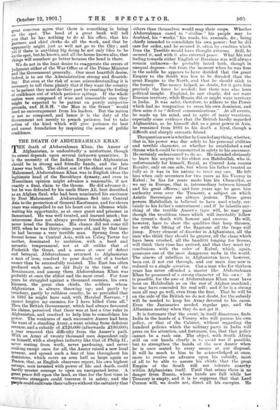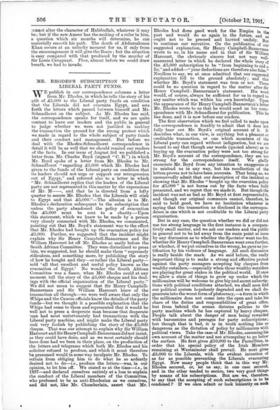LEM DEATH OF ABDURRAHMAN KHAN.
THE death of Abdurrahman Khan, the Ameer of Afghanistan, is undoubtedly a misfortune, though its extent depends upon several unknown quantities. It is the necessity of the Indian Empire that Afghanistan should be in strong and friendly hands, and the late Ameer was both. The eldest son of the eldest son of Dost Mahommed, Abdurrahman Khan was in English ideas the legitimate head of the Barukhzye dynasty, and even in Mussuhnan opinion might advance a reasonable, if not exactly a final, claim to the throne. He did advance it ; but he was defeated by his uncle Shere Ali, best described as an Afghan Saul, who had been nominated his successor by Dost Mahommed. Abdurrahman fled into Central Asia to the protection of General Kaufmann, and for eleven years was compelled to at his heart out in idleness while waiting his opportunity, as at once guest and prisoner in Samarcand. He was well treated, and learned much ; but intercourse does not always produce friendship, and he never loved the Russians. His chance did not come till 1879, when he was thirty-nine years old, and by that time he had become a very terrible man. Sprung from the fiercest house in Central Asia, with an Usbeg Tartar for mother, dominated by ambition, with a hard and sarcastic temperament, not at all unlike that of Frederick the Great, and a sense at once of defeat and betrayal, Abdurrahman returned to Afghanistan a man of iron, resolved to pour death out of a bucket sooner than be successfully resisted. The East has often produced such men, as did Italy in the time of the Renaissance, and among them Abdurrahman Khan was probably at once the ablest and the most cruel. For four years he struggled against a thousand enemies, his own kinsmen, the great clan chiefs, the soldiers whom Afghanistan is always throwing up ; and partly by treachery, partly by ruthless cruelty, he so prevailed that in 1883 he might have said, with-. Marshal Narvaez, " I cannot forgive my enemies, for I have killed them all." Then the British Government, which had always favoured his claims, perceived that there was at last a true ruler in Afghanistan, and resolved to help him to consolidate his power. The weakness. of each successive Ameer had been the want of a standing Army, a want arising from deficient revenue, and a subsidy of £120,000 (afterwards £180,000) a year removed this difficulty from the Ameer's path. With an Army of twenty thousand men dependent only on himself, with a sleepless industry like that of Philip II., never resting from work, never pardoning, and never striking except once for all, the Ameer raised a new local revenue, and spread such a fear of him throughout his dominions, which cover an area half as large again as France, that, as English observers report, his own highest satraps, men.invested with power of life and death, could hardly muster courage to open an unexpected letter. 'A great peace fell upon the land, so that for the first time in centuries strangers could traverse it in safety, and the people could cultivate their valleys without the certainty that others than themselves would reap their crops. Whether Abdurrahman cared to " civilise his people may be doubted, his " works," his roads, his arsenals, tte., being chiefly intended to consolidate his own power ; but he did care for order, and he secured it, often by cruelties which Ivan the Terrible would have thought extreme. Still, he secured it., and with it also external peace. What his real feeling towards either English or Russians was will always remain unknown—he probably hated both, though in unequal degrees—but from the moment when he was firm in the saddle he appears to have decided that the great Empire to the South was less to he dreaded than the great Empire to the North, and that he should stick to the former. The money helped, no doubt, for it gave him precisely the force he needed ; but there was also keen political insight. England, he saw clearly, did not want Russian territory, while Russia did or might want territory in India. It was safer, therefore, to adhere to the Power which had no temptation to cross his own dominion, and then seize it to " defend communications." At all events, he made up his mind, and in spite of many vexations, especially some evidence that the British hardly regarded Afghanistan, as he himself did, as a great power in Asia, he remained from 1883 to his death a loyal, though a difficult and sharply sarcastic friend.
The question now is whether he founded anything. whether, that is, his power was due solely to his personal abilities and terrible character, or whether he established a real throne which could be transmitted in safety to his successor. He certainly endeavoured to do so. He intended obviously to leave his sceptre to his eldest son Habibullah, who is, unfortunately for himself, Royal, as Central Asia counts Royalty, only on one side, but whom his father trusted as fully as it was in his nature to trust any one. He left him when only seventeen for two rears as his Viceroy in Kabul ; • he has for years made 'him his Chancellor, as we say in Europe, that is, intermediary between himself and his great officers ; and four years ago he gave him authority even over the Treasury, a subject on which Asiatic Sovereigns are always jealous. These great powers Habibullah is believed to have used wisely, cer- tainly to his father's contentment ; and if he inherits any- thing of the terrible Ameer's tiger will, he may pass though the troublous times which will inevitably follow the tyrant's death with honour and success. He will, however, have to show the qualities that keep thrones, for with the lifting of the flagstone all the frogs will jump. Every element of disorder in Afghanistan, all the men who think they should be greater, all the clans. hich have been crushed, all the banditti longing for license, will think their time has arrived, and that they must try conclusions with the ruler of Kabul, which, again, possesses one of the most dangerous mobs in the world. The sinews of rebellion in Afghanistan have, however, been cut, if not cut through, and out 'main ,fear now is reduced to a single question. Can a man who for thirteen years has never offended a master like Abdurrahman Khan be possessed of a strong character of his own l It is possible, for the awe of Abdurrahtuan Khan must have been on Habibullah as on the rest of Afghan mankind ; he may have concealed his real self; and if lie is a strong man all may go well, even from the first. That he will be on the side of the British we do not doubt, for the subsidy will be needed to keep his Army devoted to his cause. Even the Janissaries needed regular pay, and the Albanians mutiny when they do not get it.
It is fortunate that the event, in itself disastrous, finds India in the hands of a Viceroy who will pursue his own policy, or that of the Cabinet, without regarding the hundred policies which the military party in India will press on his attention, and fortunate, too, that that poliCy cannot be a rash one. The object, with South Africa still on our hands, clearly is to avoid war if possible, but to strengthen the hands of the new Ameer when he is once seated by every means at our disposal. It will be much to him to be acknowledged at once, more to receive• an advance upon his subsidy, most of all to be able to assure his chiefs that the great Empire of the South will not tolerate anarchy within Afghanistan itself. Until that arises there is no danger from Russia, whose hands are full while her Treasury is empty, and it is to suppress that that Lord Curzon will, we doubt not, direct all his energies. He mnnot alter the character of Habibullah, whatever- it may be ; but if the new Ameer has the making of a ruler in him, a question which six months will determine, he can materially smooth his path. The death of Abdurrahman Khan occurs at an unlucky, moment for us, if only from the encouragement it will give the Boers ; but the situation is easy compared with that produced by the murder of Sir Louis Cavagnari. Then, almost before we could draw breath, we had to invade.















































 Previous page
Previous page